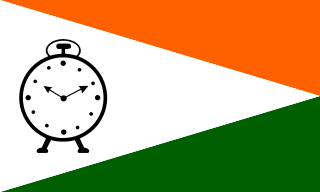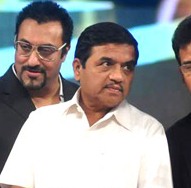
Sharadchandra Pawar is an Indian politician. He has served as the Chief Minister of Maharashtra for four terms and has also served in the Union Council Of Ministers as the Minister of Defence in the Cabinet of P.V Narsimha Rao and Minister of Agriculture in the Cabinet of Manmohan Singh. He is the first and former president of the Nationalist Congress Party (NCP), which he founded in 1999, after separating from the Indian National Congress. His NCP was split by his own nephew, Ajit Pawar. He leads the his faction NCP delegation in the Rajya Sabha, the upper chamber of the Indian parliament. He is the chairperson of Maha Vikas Aghadi, a regional Maharashtra-based political alliance.

The Nationalist Congress Party is one of the state parties in India. It refers to the Ajit Pawar faction after the 2023 split in the party when the Supreme Court of India granted the original party name and symbol to the Nationalist Congress Party. It was one of the major political parties in Maharashtra and was a recognised state party in Nagaland and Kerala. In July 2023, majority of the elected MLAs and MLCs of the party led by Ajit Pawar joined the National Democratic Alliance government, however, all MPs except two remained loyal to Sharad Pawar. This caused a direct split between the Ajit Pawar-led faction and the founder and president Sharad Pawar who formed the Nationalist Congress Party after EC recognised the Ajit Pawar faction as the original party.
Indian Congress (Socialist) (IC(S)) also known as Congress (Secular) was a political party in India between 1978 and 1986.

Raosaheb Ramrao Patil, better known as R. R. Patil, was an Indian politician from the state of Maharashtra. He was an MLA for Tasgaon vidhan sabha constituency from 1991 to 2015. He was an important leader of modern Maharashtra. He was a member of the Nationalist Congress Party. He became Home Minister of Maharashtra for the second time after the 2009 Maharashtra assembly election victory of the Congress-NCP alliance. He was also the former Deputy Chief Minister of Maharashtra.

Jayant Rajaram Patil is an Indian politician from the state of Maharashtra. He has been representing Islampur in the Maharashtra Legislative Assembly for more than 3 decades. He was the Cabinet Minister of the Water Resources Department in Uddhav Thackeray ministry. Previously he has been the Rural Development Minister, the Finance Minister and the Home Minister of Maharashtra.

Ajit Anantrao Pawar is an Indian politician who is currently serving, alongside Devendra Fadnavis, the Deputy Chief Minister of Maharashtra from 2 July, 2023. He served as the Leader of the Opposition in the Maharashtra Legislative Assembly from 2022 to 2023, and was a Member of the Parliament in the Lok Sabha in 1991, representing Baramati constituency. He has also been a member of the Maharashtra Legislative Assembly since 1991, representing Baramati constituency.
Maharashtra is India's third largest state by area and has over 112 million inhabitants. Its capital, Mumbai, has a population of approximately 18 million; Nagpur is Maharashtra's second, or winter, capital. Government in the state is organized on the parliamentary system. Power is devolved to large city councils, district councils, subdistrict (taluka) councils, and village parish councils. The numerically strong Maratha–Kunbi community dominates the state's politics. The state has national and regional parties serving different demographics, such as those based on religion, caste, and urban and rural residents.

Vijaysinh Shankarao Mohite-Patil is a politician from the Nationalist Congress Party and Member of Parliament (MP) for Madha in Maharashtra since the 2014 general election till the 2019 general election. He is member of Nationalist Congress Party.
Although a parliamentary democracy, Indian politics has increasingly become dynastic, possibly due to the absence of a party organization, independent civil society associations that mobilize support for the party, and centralized financing of elections. Family members have also led the Congress party for most of the period since 1978 when Indira Gandhi floated the then Congress(I) faction of the party. It also is fairly common in many political parties in Maharashtra. The dynastic phenomenon is seen from national level down to district level and even village level.The three-tier structure of Panchayati Raj established in the 1960s also helped to create and consolidate the dynastic phenomenon in rural areas. Apart from government,political families also control cooperative institutions, mainly cooperative sugar factories,district cooperative banks in the state, and since the 1980s private for profit colleges. The ruling Bharatiya Janata Party also features several senior leaders who are dynasts. In Maharashtra, the NCP has particularly high level of dynasticism.
Sharad Pawar broke away in 1978 from Government of Maharashtra led by Vasantdada Patil of Indian National Congress, formed the Indian National Congress (Socialist), allied with the Janata party and the Peasants' and Workers' Party of India (PWP) to form a coalition government of the Progressive Democratic Front (PDF) or Purogami Lokshahi Aghadi. The Progressive Democratic Front government was sworn in on 18 July 1978. This government was dismissed on 18 February 1980 following Indira Gandhi's return to power at the Centre.

The 2019 Maharashtra Legislative Assembly election was held on 21 October 2019 to elect all 288 members of the state's Legislative Assembly. After a 61.4% turnout in the election, the ruling National Democratic Alliance (NDA) of the Bharatiya Janata Party (BJP) and Shiv Sena (SHS) won a majority. Following differences over the government formation, the alliance was dissolved, precipitating a political crisis.

Prithviraj Chavan was sworn in as the Chief Minister of Maharashtra on November 11, 2010. The following is his cabinet. The government consisted of Chavan's Congress party and the Nationalist Congress Party.
Sharad Pawar was sworn in as Chief Minister of Maharashtra for the fourth time on 6 March 1993. On appointment, Pawar formed a 18-member cabinet. The cabinet continued until the 1995 legislative elections, and was replaced by the Manohar Joshi ministry.
Sudhakarrao Naik was sworn in as Chief Minister of Maharashtra on 25 June 1991, on resignation of his predecessor Sharad Pawar. The ministry served until February 1993, when Naik resigned due to his inability to handle the 1993 Bombay riots, and was replaced by Pawar.
On resignation of Shankarrao Chavan on 26 June 1988, Sharad Pawar was appointed Chief Minister of Maharashtra for the second time. Pawar formed his second ministry, which continued in office until legislative elections in 1990.
Shankarrao Chavan was sworn in as Chief Minister of Maharashtra for the second time in March 1986, on resignation of his predecessor, Shivajirao Patil Nilangekar. Chavan's cabinet served until his resignation on 26 June 1988, and subsequent replacement by Sharad Pawar's ministry.
After the Congress (I) party secured a majority in 1980 Maharashtra legislative elections, A. R. Antulay was appointed Chief Minister. Antulay's administration continued until January 1982, when he resigned amidst corruption allegations. Till date, Antulay remains the state's only Muslim chief minister.
Shankarrao Chavan was appointed as Chief Minister of Maharashtra for the first time on 21 February 1975, replacing Vasantrao Naik. His first ministry lasted till 16 April 1977, and was succeeded by Vasantdada Patil's ministry.
Yashwantrao Chavan formed his second ministry as Chief Minister of Maharashtra on 8 March 1962, after leading his Indian National Congress to a majority in 1962 Maharashtra Legislative Assembly election. He demitted office in November 1962, having been appointed Minister of Defence by Prime Minister Jawaharlal Nehru. He was succeeded by his buildings and communication minister, Marotrao Kannamwar.
Following 1972 Maharashtra Legislative Assembly election, incumbent chief minister Vasantrao Naik was re-appointed, and he formed his third government on 14 March 1972. This was to be Naik's last government which served until 20 February 1975.








